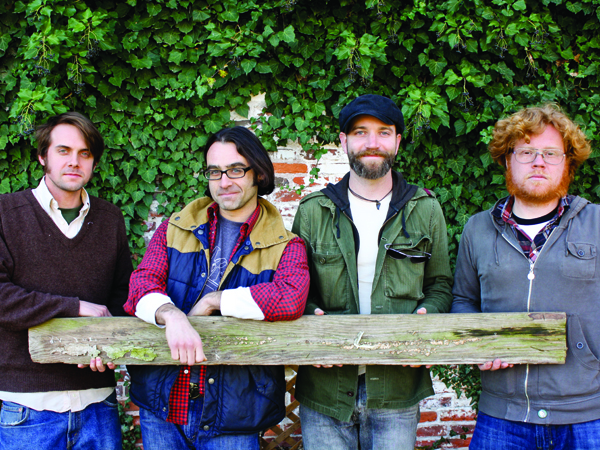 Philly raconteurs Hoots and Hellmouth promote local farms on tour
Philly raconteurs Hoots and Hellmouth promote local farms on tour
by Andrew Thompson
Amid the hustle of touring—going from town to town and not being able to stop for more than a few hours to play a show, fill your stomach at a Cracker Barrel and jet off to the next venue—it can be hard to find a small food co-op, especially when the town you’re playing in doesn’t have one, says Sean Hoots, guitarist/lead vocalist for Philly-based roots rock band Hoots and Hellmouth.
But it’s something that the band has vowed to do—and if they can’t find one, they want to get others to make their own. Sitting in Andrew “Hellmouth” Gray’s West Philly house, Hoots, a full-faced man with bright, shaggy red hair, declares the band’s mission for upcoming tours: Get people talking about local food production.
Hoots and Hellmouth have referred to themselves as “new music for old souls,” but talking to them, you get the sense that they’d be happy to be known as “new music for all souls,” a highly accessible sound meant to foster a sense of community among listeners. And “food is the most obvious kind of issue to take up when you’re talking about a local community,” says mandolinist/vocalist Rob Berliner, sitting on the couch next to Hoots.
Since they formed in 2004, the band has played at farmers’ markets around the city. Right after their inception, they began a video project in Charlestown about local farms, and had the program not been stillbirthed, viewers would have seen the band harvesting food, cooking the food they harvested, eating the food they cooked and playing music for dessert.
In their old respective bands, issues like local agriculture were “off our radar,” says Hoots. “[But] I’ve always been into food and a voracious reader, and eventually the two worlds collided.” He cites Derrick Jensen’s Endgame, a two-volume work on the inherent problems of civilization, as a particular influence—“I remember reading it and thinking, ‘We’re all [in trouble]!’ ”—as well as his own work on a farm in Chester County. Bassist John Branigan, one of a few in the band’s stable of upright bassists, helped found a community-supported agriculture farm in Gettysburg.
The idea is to at least patronize places involved in local food production with an overarching focus of sparking a conversation between potentially disparate audience members. “Ultimately, the goal is to say, ‘you people, meet other people’ ” says Berliner, waving his hands first to the left at theoretical attendees already involved in small farming, then to the right at the ones who might have an inkling of interest. This means avoiding preachy pedagogy in favor of setting up an extra booth next to the merchandise table, or briefly mentioning important issues instead of sermonizing.
At one point, Branigan starts into a lengthy explanation of inorganic fertilizer. “The only way that the earth makes [ammonium nitrate] is through legumes… or if lightning strikes. That’s it. So the amount of biomass that’s available to humans now, as a result of synthetic fertilizer, is potentially more than the earth would produce.” He pauses, then adds, “I just totally went off on that.”
“No, no, that’s good stuff,” says Hoots. “I mean, those are the issues that as a band we don’t really have any kind of connection with, but by going to these different communities and trying to be some kind of catalyst or provide some sort of forum—music unites people in general, and if we can get a bunch of people together, some of whom occupy this sector and others, we can start some sort of dialogue and say, ‘Listen, local sustainability on every level is in everyone’s interest.’ ”
For towns already infused with a sustainable mentality, the task is more to be a part of the conversation than to start it. The real challenge is to foster that same dialogue where issues of sustainability are nearly silent. “Maybe people are just independently doing their own thing,” says Hoots, “and if they all were sort of able to combine their efforts, the synergy would perhaps foster a transition community, something that will help us move past the petroleum age, which is obviously quickly declining, into something where we can all depend on each other in a local community.”






With such a decline in local farming it is definitely becoming a community effort to keep produce sourced locally. This has been on the increase over here in the UK, glad to see it is as much of a serious matter over there.